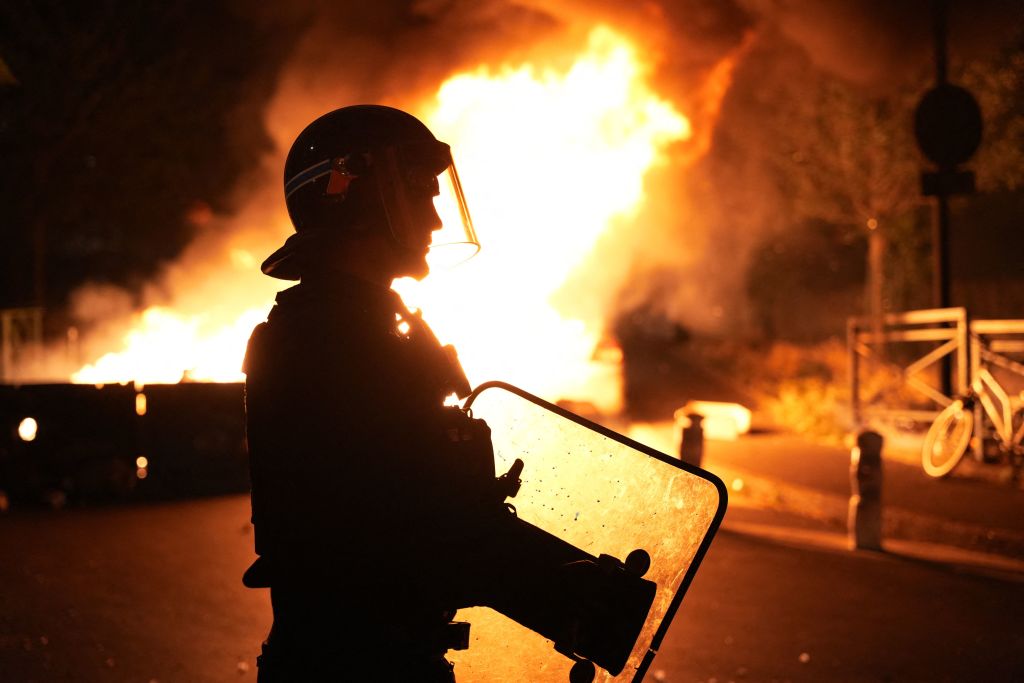In the City of Light, darkness descends. Paris—along with the rest of France—is caught in the grip of unprecedented chaos. From Normandy’s quaint villages to the grand boulevards of Paris, a harrowing wave of violence has turned the country’s postcard-perfect charm into a nightmarish tableau. Beyond the physical damage lies a chilling threat: the government’s drastic measures to silence free speech. As the nation once hailed as the birthplace of modern democracy takes an Orwellian turn, the world watches, aghast and anxious.
For the past week, France has been under siege. An initially peaceful protest against a controversial police action escalated into a full-blown uprising. Streets that once bustled with life now resemble war zones. The toll so far: over 1,000 buildings burnt, 5,600 vehicles destroyed, and 3,300 arrests. These events have not just shaken the French Republic to its core, but they’ve also dealt a crippling blow to its economy. Business association Medef estimates the cost to French businesses at an astronomical $1 billion.
Among the casualties are over 200 businesses, 250 tobacco stores, and 300 banks. Looting and arson have scarred the idyllic French landscape, rattling the national psyche. The chaos has already begun to cast long shadows over the forthcoming summer tourist season, an economic lifeline for many local businesses.
The wrath of the rioters hasn’t discriminated. Buildings of every kind—commercial establishments, residences, even religious structures—have borne the brunt. As the flames subside, the damage will likely be much higher than current estimates suggest.
The incident that ignited the spark was a fatal police shooting of a 17-year-old boy, Nahel, during an attempted traffic stop. Outrage over his death unleashed a torrent of pent-up anger and frustration that swept across the nation. The government’s response, involving mass arrests and draconian law enforcement measures, only added fuel to the fire.
Public opinion is sharply divided. A recent survey indicated that 89% of respondents condemned the violence against the police, while only 20% expressed understanding for the riots. Notably, the majority of respondents pinned the blame on parental negligence and lax law enforcement. Furthermore, confidence in the police remains high at 71%, yet 76% of respondents criticized the government’s handling of the situation.
The French government’s response to the crisis has been nothing short of controversial. Digital Minister Jean-Noël Barrot confirmed that social media platforms were directed to remove “several thousand illegal content” and delete “several hundred accounts” during the riots. Measures have been taken to change social mediaalgorithms to prevent images of violence from going viral. This revelation adds another dimension to the crisis, sparking fears of state-led censorship and an orchestrated assault on freedom of expression.
Economics Minister Bruno Le Maire and right-wing leader Jordan Bardella demanded “consequences for parents” of young offenders. Bardella advocated suspending welfare for parents of repeat minor offenders and ending subsidies for problematic areas. Such controversial statements seem to be shifting public sentiment, with half the population reportedly perceiving right-wing leader Marine Le Pen as having been strengthened by the riots.
However, it wasn’t just the right-wing’s rhetoric that drew attention. Republican Senate speaker Bruno Retailleau sparked outrage when he suggested that rioters may be French “by their identity” but show a “kind of regression towards ethnic origins.” This remark was met with widespread criticism, including Communist MP Elsa Faucillon labeling his words as “racist par excellence.”
Free Speech on Fire
As the government clamps down on freedom of speech and exacerbates societal divisions, France is spiraling into a crisis that reaches far beyond the initial riots. Its very identity as a democratic republic—one of the world’s oldest—is under threat. The cost of this crisis, in terms of damage to infrastructure and businesses, is immense. Yet, the cost to France’s democratic values, as it struggles with a rising tide of censorship and division, may prove even more devastating.
France now stands at the crossroads, its future uncertain. The ruins of the riots bear silent testimony to the anger that rages beneath the surface. Amid the palpable fear, one question resonates: where is France headed? The government’s assault on free speech and its attempts to manipulate narratives raise alarming questions about its commitment to democratic principles. As the dust settles, it’s clear that the France we knew is irrevocably changed. The chilling echo of this ordeal will reverberate long after the last flame has been quelled. In this dark hour, the world’s beacon of democracy appears to have dimmed.



